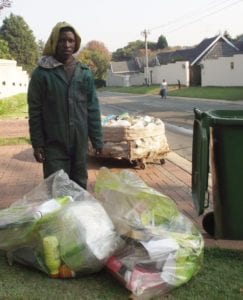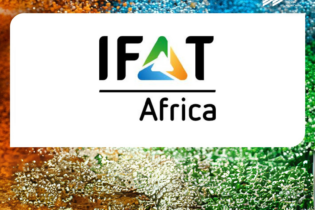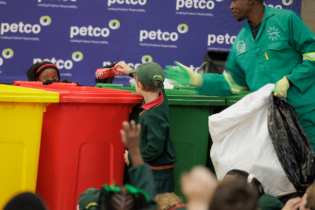
Kgotso is an Abagerezi working in in Parkmore, Johannesburg. Washing and pre-separating recyclables before putting them in kerbside bins for collection assists trolley-pullers get what they need more quickly so they make more money from the materials they sell.
Yet, there are still many barriers preventing trolley pullers from developing further into more profitable entities, such as cooperatives or even companies.
Challenges One of the biggest barriers is the fact that banks won’t give trolley-pullers bank accounts, let alone finance for vehicles and business loans. “Even myself, I cannot get a bank account. This is very dangerous because it makes our business a ‘cash-in-hand’ business. This exposes us to criminals and threatens our lives. Maybe some kind of technology could be developed so that recycling centres could pay money to our cell phones?” asks Nkosi. Elsewhere in the country, recycling industry bodies are already looking into the rollout of a token system which would exchange high volumes of clean recyclables for tokens which could then be exchanged for cash. The details are yet to be announced and it is still unclear to what extent such a system would benefit the Abagerezi. “Another problem we face is exploitation by middlemen. A trolley-puller might work an entire day, hoping to earn R50. The average exchange rate per kg of waste is about R3. After a trolley-puller has pushed his cart for 10km he won’t turn back and look for another materials buyer if the first one he gets to offers him only R2.50 or even R2,” says Nkosi. Recycling purchase rates can be dependent on the quality of recyclate being bought. Quality, quantity, grade and contamination level play a role in the eventual price. It is for this reason that education and skills development is crucial for informal recyclers. That’s not to say that trolley-pullers are not exploited but this is a highly complex issue and there are no easy answers. “Something else we’ve encountered is businesses designing trolleys which they give to us and also giving us bicycles. For this we are grateful but there are some problems. One company who gave us trolleys did not consult the Abagarezi first to find out what we needed, so what we got wasn’t useful. Also, if you give an Abagerezi who smokes [drugs] a bicycle, he will sell it to the first person who offers him R100 for it,” explains Nkosi. Government support Nonhlanhla Baleni, director of environmental health at Fezile Dabi district municipality praises the work trolley-pullers do for their communities but he notes that integrating them into the formal recycling sector is a challenge. “I work closely with the municipalities in the district, monitoring their interactions and engagements with trolley-pullers and waste pickers. “I applaud the work they do. The main challenge we’ve come across is that many people working in that space are in South Africa illegally, and so don’t want to be formalised. That makes it difficult for us to create a database of informal recyclers,” says Baleni. He also points of that if trolley-pullers form and then register as cooperatives it becomes much easier for municipalities to get in touch with them and give them the skills development support and financial assistance they need. Separation at source Douw Steyn, director of sustainability at Plastics|SA comments, “government is already looking at formalising the informal waste collection sector. We in the packaging recycling industry rely heavily on trolley-pullers and waste pickers to get good, clean material for processing. If government successfully implements separation at source, that would increase recycling volumes drastically.” Separation at source would also make the Abagerezi’s job much easier by making clean recyclables easier to collect in the necessary bulk quantities to make it worth their while, giving real impetus to the much needed recycling revolution. *Statistics quoted from The Waste Information Baseline Study conducted by the Department of Environmental Affairs (2011) during Edna Molewa’s “War on Waste address at Wjite River (2015). **82.2% is the weighted average of post-consumer paper and packaging collected by trolley pushers and waste pickers – according to a CSIR study. Estimated on the amount of waste recycled through the informal recycling sector vary, especially from waste stream to waste stream.





